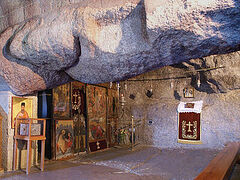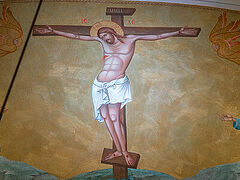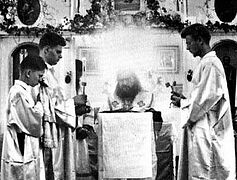Maslenitsa—Cheesefare Week—has begun. It is the last week before Great Lent, called in the Church, the “Week of the Last Judgment”. During this time, both fasting and the absence of fasting, festivity and thoughts of death, resurrection, and the Last Judgment are paradoxically united. We asked the rector of the Church of the Resurrection of Christ in Kadyshy, and the dean of the School of Church Arts, Archpriest Alexander Saltykov, to tell us about how the Church prepares Christians for Great Lent during Cheesefare Week.
 Archpriest Alexander Saltykov. Photo: Alexander Philippov
Archpriest Alexander Saltykov. Photo: Alexander Philippov
On fasting and Cheesefare Week
Maslenitsa is probably Russia’s favorite holiday after Christmas and New Year. But is Maslenitsa a holiday? In pre-Christian times, Maslenitsa was a festival of spring and sun after the long, cold winter. The new year began with the month of March. Spring is always a joyful time, and in the Church it coincides with Great Lent. I would like to talk about the spiritual side of the days of Cheesefare Week, the essence of which is preparation for Lent and Pascha.
First of all, do non-religious people notice that the date of this festival is movable and different every year? This happens because the date is tied to the Church calendar, the Paschal cycle, and is dedicated to our preparation for the greatest, most joyful, yet most difficult event—the feast of Pascha. According to the Church’s teaching, these days are dedicated to the remembrance of the Last Judgment. True, only the Church is talking about the Last Judgment and Great Lent. Why does this happen? Many talk about the Church in society, but there are things more pleasant and interesting to us, and there are things that are not so pleasant.
Cheesefare Week is of course interesting for us, but Great Lent may not be so pleasant as to talk about it much. I am referring not only to atheists, but also those who consider themselves believers, but only “in their souls”, and don’t go to church.
Maslenitsa is viewed as a time to have fun. By the way, we also need a little fun, especially for children. Christians have a reason to be joyful because Great Lent is the spiritual spring, the renewal of the human heart. And after all, Cheesefare week is a time to think about the Last Judgment. But why? Because we are to remember the meaning of human existence, the beginning and the end of human history. And the Church helps us in this by establishing a special time for this. During these days we imagine the end times, when after inescapable terrible trials for all mankind, the end of history will come—the whole world, the whole universe will be shaken and catastrophically changed, the victorious sign of the Cross will appear in the heavens, and people will see the Son of God, the God-Man, Lord Jesus Christ in unfathomable, great, and incomprehensible glory. And on the last day before the fast, on Forgiveness Sunday, we remember the beginning of history—the casting out of the first people, Adam and Eve, from paradise on earth, having lost their original grace.
Cheesefare Week is already Lent
Maslenitsa is dedicated to Lent, and not only that; it is already a partial fast in and of itself. Everyone knows that Cheesefare Week means abstaining from meat. We can eat only milk products—cheese and butter, which is where it gets its name [fish is also allowed]. The Catholics have another name for these days—Carnival, which means literally, goodbye, meat. It is the time when they no longer eat meat, only cheese and eggs. In other words, Carnival is also a fast, but this has been long forgotten, and Carnival has become a time of fun and at times unbridled revelry. Anyone who goes to carnivals should know and remember this.
But what is Lent? Even other Christians who have fallen away from Orthodoxy have fasts. For example, Catholics have Ash Wednesday. Other religions also have fasts. But none of them, not the Catholics, the Jews, Moslems, Buddhists, or others, have such a fast as our strict and lengthy Great Lent. This is one of the features of Orthodoxy. The only religion that teaches temperance in a real way and goes against the mainstream movement of all mankind towards intemperance is Orthodox Christianity.
Fasting is our wealth. In the twenty-first century, when everything is directed towards entertainment and all money is the measure of all things, man is completely losing all control over himself. He doesn’t even want to think about being obligated to restrict himself in anything. Practically everyone lives that way, both children and adults. The most important thing to us is pleasure.
During the fast, a person forces himself to restrain from the foods, entertainments, and pleasures that attract him. He must conquer himself. Only by conquering oneself does someone truly come into personhood. Victory over oneself is the most difficult task, with which everyone who enters into this struggle can agree. The main goal of this war with oneself and the reward for victory is communion with God.
Do we need abstinence, training of the will; do we need to learn to do not what we want but what we must? All can agree that this is an important and necessary ability. But how can we achieve it? It is quite obvious that only the Church is the power that can reward a person for such a path. But not all go to the Church.
During Cheesefare Week, read Revelation
In the final years of the Soviet regime, people in Russia started celebrating Maslenitsa as a pagan spring festival. But the fact that Cheesefare Week is dedicated to the Last Judgment was forbidden to even discuss publicly. “What Apocalypse? That is all something the priests dreamed up to deceive the people.” I recall a comical slogan from those days: “We won’t allow an apocalyptic dead end!” How is it that we “won’t allow” it, when everything was directed at pushing mankind into the abyss! Moreover, the Apocalypse, quite contrary to being a dead end, shows the only escape from the current situation.
 Archpriest Alexander Saltykov. Photo: Alexander Philippov
Archpriest Alexander Saltykov. Photo: Alexander Philippov
The theme of the Last Judgment occupies an important place in the New Testament. Christ spoke of it in the Gospel, the apostles talked about it, and part of the New Testament is the book called the Revelation of St. John the Theologian.1
The Word of God forces us to remember the end times. The Bible begins with judgment and ends with judgment. Adam and Eve violated the commandment not to eat of the fruit of the knowledge of good and evil, and God pronounced judgment. The Creator asks, “Adam, what have you done?” To put it in modern terms: “What motivated you to commit your crime?” Adam has no explanation, only an attempt to justify himself: “The wife You gave me…” Adam and Eve did not want to admit their guilt, and God judged them and cast them out of Paradise. After being cast out, they sat down across from paradise and wept, because they had lost so much: paradise and eternal life. But paradoxically as it sounds, certain features of our world nevertheless have a distant resemblance to paradise—there are corners of extraordinary beauty, there are unforgettable moments of communion with nature and good, bright people… In man’s memory remains a vague concept of paradise, from which our fore-parents came. And we, the faithful, all want to get to paradise.
After death, everyone will have his own lot. Every person will go through his own personal judgment—in this life he is judged by his conscience, and God will judge everyone after death. This is the personal judgment. And if a person is not forgiven, then he remains in expectation of the Last Judgment. Thus, the story of Adam and Eve is repeated with all people. Nevertheless, in Scripture it says that the righteous will not come to the Judgment. But the Church prays every day for sinners. Such is the spiritual-moral establishment of the Bible from the first to the last pages.
Thus, if the Church established that the remembrance of the Last Judgment be established just before Great Lent, then the faithful should think about the final days of the world, which will come in the future.
We know of many incidents in history when people awaited the end of the world. Catholics, you could say, were accustomed to expecting the end of the world in the Middle Ages, and now they almost never talk about it, because it seems “too indefinite” for a rational person. From our point of view, they hope too much in their own reason, in the “evolution” of society, but not in faith. Rationalism, of course, has a specific basis, because God gave man reason so that he would properly order his life. But the mind should assist faith, and not reject it. We see that much that is irrational and as if unwise in the world. People often do crazy things. During the revolutionary period in our country, there was truly insane behavior, atrocious murders, the mad destruction of churches. Even our own generation witnessed much of the same. What was this? In history, sometimes the mind prevails, and sometimes mindlessness. Christians should rely not only on the mind, but to a much greater degree on faith in God. Faith proceeds from the heart. And in faith there is wisdom, which is higher than the mind. But even the mind suggests to us that man needs fasting because it organizes and cultivates personal qualities in a person.
The Last Judgment and Forgiveness Sunday
The last day of Cheesefare Week is Forgiveness Sunday. This is a remarkable institution; on this day, we have the opportunity to forgive each other and receive forgiveness ourselves before the Last Judgment. We are often resentful and hold onto so much in our hearts that is not conducive to good relations with each other. So often we offend our close ones and people we do not know very well, both consciously and accidentally, as if fleetingly, in our thoughts, glances, and the thoughts of our hearts, and in many and different ways. I will be so bold as to suggest that Forgiveness Sunday is a sort of small image of the Last Judgment for a Christian, who on this day repents and receives not condemnation, but forgiveness.



